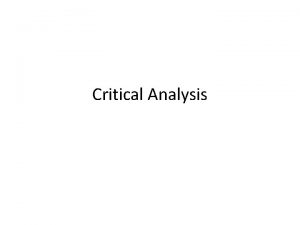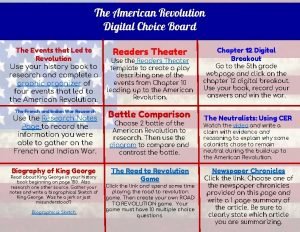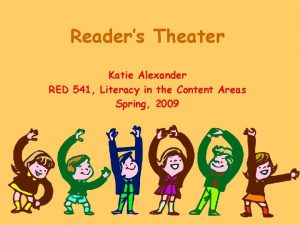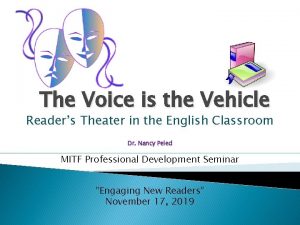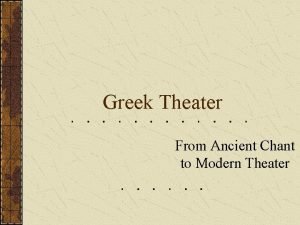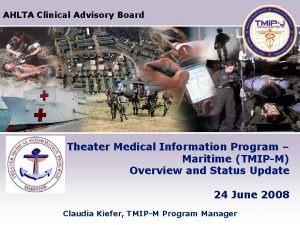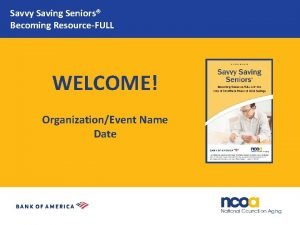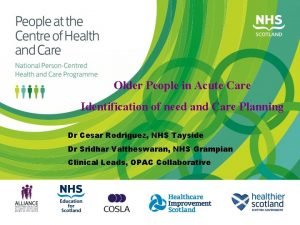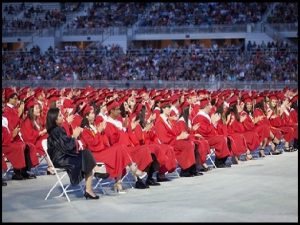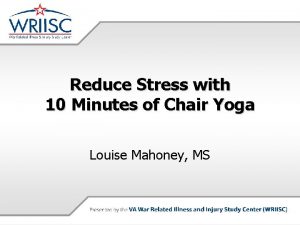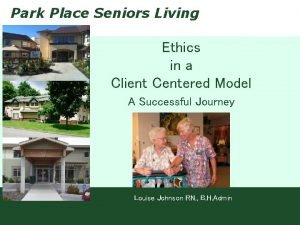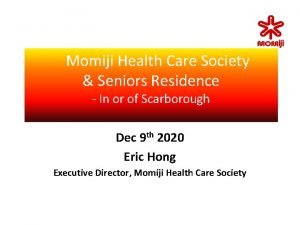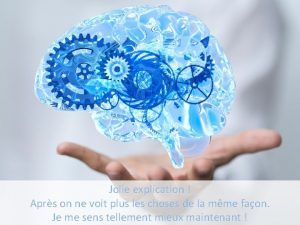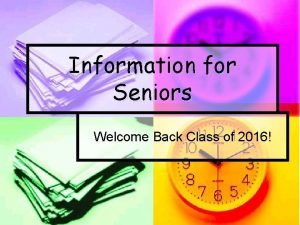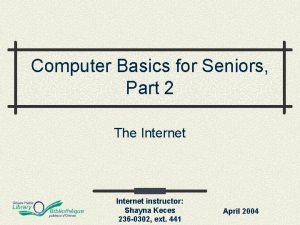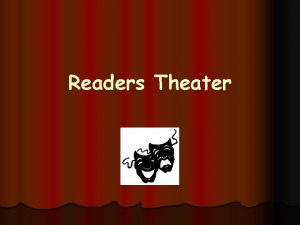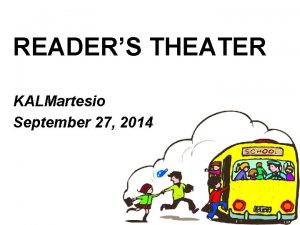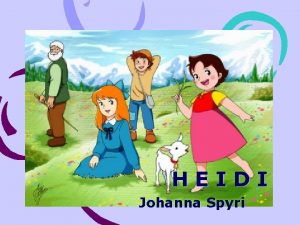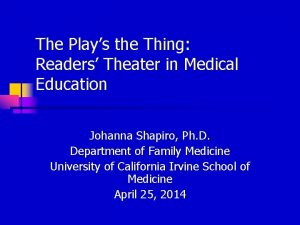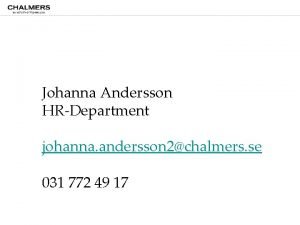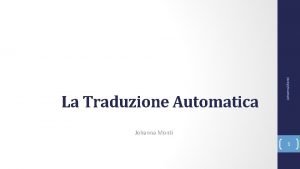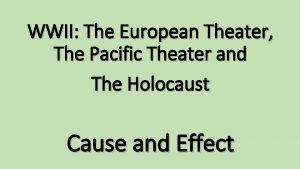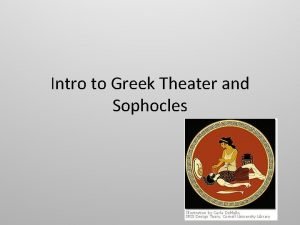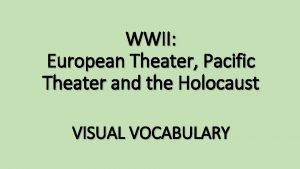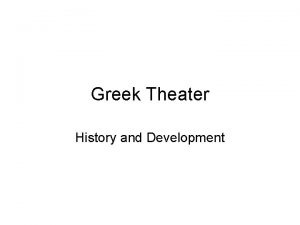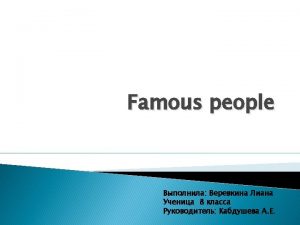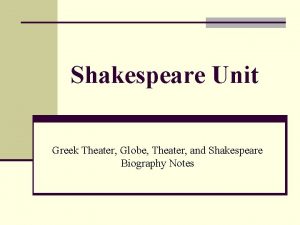Medical Readers Theater Medical Students and Seniors Johanna
















- Slides: 16

Medical Readers’ Theater: Medical Students and Seniors Johanna Shapiro, Ph. D. Beverly Cho, M. D. Laura Mosqueda, M. D. Nokteh Taheri, Ph. D.


What is Medical Readers Theater? n n n n n Simple, enjoyable way to present medically-themed skits Sometimes used in medical education to engage students with the human side of medicine Some programs have involved senior citizen groups to explore issues of particular relevance to aging patients Participants not expected to be trained actors No memorization or staging; read from scripts Skits take no more than 15 -20 minutes to present Those not directly involved in skit serve as the audience Performance of skit is followed by group discussion MRT is appropriate for many educational venues Positively evaluated by participants


Medical Readers Theater at UC Irvine School of Medicine n n Support from: Donald W. Reynolds Foundation Partnering of n n n Participants n n n UCI College of Medicine Program in Geriatrics, UCI School of Medicine’s Program in Medical Humanities & Arts, UCI Department of Family Medicine, Regents’ Point, an independent living facility in Irvine, 8 -10 third year medical students/session (total 100 over one year) Medical educator (facilitator), geriatrician, interested RP residents Structure: n n n One required 1 ½ hr. session/month Introductions and warm-up exercise (truth and lie) Students and RP residents volunteer for roles in geriatrics-themed skit Students/residents with no role comprise the “audience. ” Group discussion n n first comments on the issues raised by the performance segues into what students can learn from RP residents’ personal encounters with the issue under consideration

Purpose of MRT at UCI n Opportunity for students/seniors to interact with each other around issues of significance to both: n n n n n aging, disability, doctor-patient relationships, stereotyping of older patients, communication barriers, end-of-life, dementia, healthcare for individuals at this stage of life Can reflect more deeply on each others’ perspectives Have an enjoyable, memorable interaction

What we’ve learned: Medical student’s perspective n n n Seniors more open to talking about “sensitive issues” than we expect Students appreciated the perspectives of seniors n On patient/physician interactions n On their own (seniors’) health The opportunity to meet and converse with seniors in a relaxed, nonacademic setting was highly valued Students appreciated being able to learn from guest geriatricians Students were more inclined to participate and be engaged when there were a larger number of residents The process of creating a script is an fun, rewarding experience that can be used as a way to develop insight into aging

What we’ve learned: Medical educator’s perspective n Nokteh – 5 min

What we’ve learned: Geriatrician’s perspective n Laura – 5 min

What’s the evidence? Student evaluations, N=75 1=Poor, 2=Fair, 3=Good, 4=Very Good, 5=Excellent, 6=Superior, 7=Outstanding Questions Mean SD How would you rate this session overall? 5. 9 1. 2 I developed new insights about aging and caring for geriatric patients 5. 7 1. 3 The session helped me to better understand the perspective of elders about their lives/healthcare 5. 9 1. 2 Issues relevant to geriatric healthcare were presented in an enjoyable manner 98. 7% yes ---- Was the session useful to you? 5. 9 1. 3

Students’ Views II

Student Narrative Comments n POSITIVE n n Really creative way to discuss end-of-life issues It was great to hear the residents take on an explanation of a passage that is so relevant to their current state of life I liked how we got input from the seniors and how we talked about very relevant issues like burn-out in the medical profession and how to handle mistakes Reminded me not to generalize n NEGATIVE n n Not enough on residents’ perspectives. They all came to talk and we wasted time with fiction Reading an excerpt from a short story does not advance my understanding of medicine More issues relevant to geriatric medicine More focus on seniors’ experiences with/views of doctors

Seniors’ Views

Seniors’ Narrative Comments n POSITIVE n n Informative, caused thoughtful discussions with students and good insights Hearing the students’ outlook and fellow residents’ opinions was valuable The fact that the conversation increased student awareness of issues (potential influence on doctors) Great opportunity to get a look at future physicians and a look at my own relationship with MDs n NEGATIVE n n Scripts too long Length of discussion

Conclusions n Seniors n n n enjoy MRT Find it helps them reflect on difficult issues Students report n n n MRT is enjoyable, worthwhile, and useful MRT is an excellent way to address sensitive issues in geriatric healthcare Strong benefits in terms of n n n Moderate benefits in terms of n n n New insights into aging and caring for elders Better understanding of older pts’ perspectives on life/healthcare Greater awareness of older pts’ health-related concerns Improved interaction and communication w/older pts * Almost 20% would not like to participate again

 Critical reading meaning
Critical reading meaning American revolution choice board
American revolution choice board Where the wild things are readers theater
Where the wild things are readers theater Where the wild things are readers theater
Where the wild things are readers theater Civil war readers theater
Civil war readers theater Greek theater vs modern theater
Greek theater vs modern theater Tmip navy
Tmip navy Savvy saving seniors
Savvy saving seniors Identification of seniors at risk
Identification of seniors at risk Dutchtown high school seniors
Dutchtown high school seniors Cbhs seniors
Cbhs seniors Seated triangle pose
Seated triangle pose Park place senior living
Park place senior living Momiji health care society
Momiji health care society Pps humour seniors
Pps humour seniors Welcome back seniors
Welcome back seniors Internet basics for seniors
Internet basics for seniors
